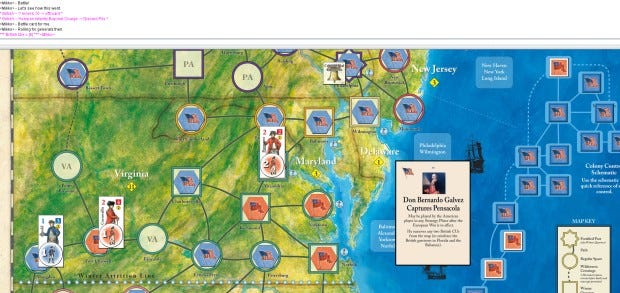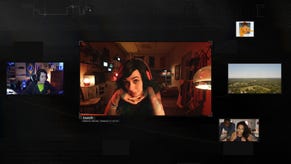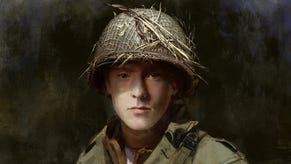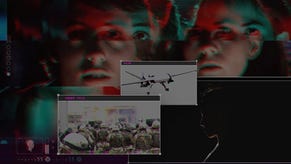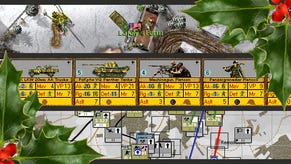VASSAL: A Virtual Army of Conflict Sims In One Client
A Loyal Vassal Of King Boardgames
If you want to play a board game, one of the most essential ingredients is someone to play against. I found this out the hard way as a first-time parent, house bound by the demands of a baby and drained of energy but not my feverish appetite for gaming.
That’s when I discovered VASSAL. It’s a freeware, open source Java program that lets you play boardgames over the internet, either live or via email. And not a narrow selection, either: each game requires that you download a specific module, and the official site alone lists over 1,300 of them. There are more out there in the wilds.
At the point of succumbing to child-induced cabin fever, I was suddenly free to choose from this bewildering library of brilliance and play games as slowly as I wanted without ever leaving the house. There were games I already owned, games I wanted to try, games I’d never heard of but sounded superb; all at my fingertips alongside an army of eager opponents.
Monster Games
It’s a situation that Joel Uckelman, the project leader on VASSAL, understands well. “If I want to play the full campaign in DAK II it would take weeks,” he tells me. “I'd have to keep our two-year-old daughter and two cats away from the kitchen table that whole time. It’s a great way to accommodate large, long games.”
DAK II is a monstrous military simulation of North Africa during World War Two, with 1500 counters and five 22” by 34” maps. It’s not hard to see why anyone wanting to play it might prefer to do so on the convenience of their computer desktop. It’s also representative of the bulk of games that can be played on VASSAL, most of which – though not all - are conflict simulations of some kind.
Joel lets me in on a particular reason, beyond the administrative advantages, why this should be so. “VASSAL began as VASL: Virtual Advanced Squad Leader. It was just for ASL, not a general program for playing board games,” he says. “When VASSAL became a separate project, it had the capabilities you need for games with stacks of square pieces on a hex grid - i.e. classic wargames - but not much else. Support for things like cards wasn't added until later, so wargames had a head-start.”
Faceless Opponents
This helps explain another anomaly. Board games are traditionally viewed as primarily social experiences, giving players the chance to glory in the startled expressions of their opponents before laying the smackdown. Moving them online seems inherently contradictory. But wargames tend to be slow, heavy, two-player affairs where the social dimension takes a back seat.
Nevertheless, Joel agrees they’re better played face to face. “My grandfather always said that to get something, you have to give something up,” he says. “But it's not a question of VASSAL replacing face-to-face play. Any game I play using VASSAL is a play I wouldn't have had otherwise.”
And, as he points out, the experience has its compensations. “I’ve never clumsily knocked over a stack of pieces with an errant die roll in VASSAL, I can think as long as I want about a move when playing by email, and I have a log of the game when we're done.”
Whatever its shortcomings, it’s become incredibly popular. Joel’s been on the project since 2006, but it was originally released in 2003 by Rodney Kinney and has gained a devoted following. Joel goes so far as to suspect that “the vast majority of wargames are not played live.”
Legal Loopholes
But since VASSAL is free software, and the majority of the game modules available for it are fan-made and released for free, it would seem to be on rather sticky legal ground even though the terms and conditions specify that users must own a physical copy of the game. I presume that Joel would know a reasonable amount about copyright law, and he doesn’t disappoint.
“There is, to the best of my knowledge, no jurisdiction in which it is illegal to *produce* VASSAL modules,” he tells me. “Copyright law in the US, at least, tends to be about distribution, not production. But I can hardly see that it would be worthwhile for anyone to go to court over any of this, since we remove modules from the site whenever asked.”
This does happen. I’m aware of at least one publisher, Fantasy Flight Games, who dislike people making VASSAL modules for their games. But does it happen often? “Seldom,” says Joel. “It happened once or twice last year.”
Is it permitted because most users do own a copy of the game? “It's typical that some players don't,” admits Joel. “But I don't see a substantive difference between playing in person and playing using a computer in that regard.”
The only option left is that publishers benefit from VASSAL in some way. This is what Joel believes. “If none of the players owns a copy of the game, I would hope that the experience leads some of them to buy the game,” he says. “There’s anecdotal evidence for this: you can find loads of posts on BoardGameGeek where someone says they played the game on VASSAL and bought it because they liked it so much.”
Is VASSAL treated by publishers as free marketing? Joel thinks so. “The rational approach is to consider people playing games they don't own as free advertising,” he tells me. “Some people who would not have otherwise had the opportunity to play your game might play it in VASSAL and go on to buy a copy, and those who persist in playing without buying a copy weren't going to be your customers anyway.”
Competitive Games
Since the use of client software to facilitate games via email is not only legal, but positively encouraged by most publishers, it’s not surprising that VASSAL has some competition. The best-known is probably the windows freeware program Cyberboard which has been around since the mid nineties, and there’s a new kid on the block called ZunTzu.
But VASSAL remains the tool of choice for most gamers. When I ask Joel what he thought it had over its competitors, his reply is clear and immediate: “It's cross-platform, it's open-source, and it's not a one-man operation.”
He’s a big fan of the open source philosophy. “I don't want my virtual tabletop software to dictate my choice of operating system or opponents, and I'm not alone: 15% of our downloads are for non-Windows builds,” he tells me. In fact, as a Linux user, he first got involved in the project out of a desire to play games online against Windows-using friends.
But it’s as much about the collaborative power of open source as it is about stepping away from commercial operating systems. “It's easy to get burned out when a project is your sole responsibility,” Joel points out. “Because VASSAL is open-source, anyone with the necessary skill can lend a hand. I know of at least 29 people who have written code for VASSAL.”
That critical mass of people provides the underpinning for an active community. “There is daily activity in our forum,” Joel tells me. “We have an IRC channel (#vassal on freenode.net) which has some regulars who are willing to help. If you have a question about or a problem with VASSAL you can usually get a reply, if not always a solution.”
History has a Future
It’s the sort of snowballing effect that many open source projects only dream of, where motivated programmers support an active community which in turn encourages an expanding user base from which new people can be recruited. With so much magic in the air, there were bound to be exciting plans for the future of the software. But I wasn’t expecting anything as big as the details Joel confides.
“Java is becoming increasingly decrepit,” he tells me. “And we've been struggling for years with some design limitations of VASSAL. We're addressing both problems at once with VASSAL 4 by switching away from Java.”
An entire platform switch is a big goal for any project, but Joel is intent on shoehorning in more features at the same time. It’s not a trivial list, either. “Among our goals for V4 are a simpler, modern graphical interface, an embedded scripting language which is not VASSAL-specific and persistent remote storage of game state.”
There are other goals, too, and it’s such a colossal wish-list of feature that I can’t help but worry that it could be crunch time for the project: an overly-ambitious set of goals that could lead to burnout and despair. That’d be a small personal disaster for me, and for thousands of other gamers who’ve become addicted to the mystical way that VASSAL lets you re-create history with strangers on the other side of the world.
But Joel seems reassuringly confident. His belief in the power of open source programming and his obvious commitment to the project come through loud and clear in his answers. VASSAL is probably the most-used piece of software on my PC, more than office programs, more than Steam. But if there’s anyone I reckon I’d trust to look after it, it’s Joel.
